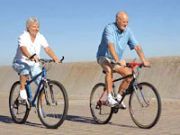Article
Exercise Increases Benefits of Testosterone Therapy in Hypogonadal Men
Author(s):
A new study finds that regular exercise can boost the effect of testosterone replacement therapy among men who suffer from late-onset hypogonadism.

A new study finds that regular exercise can boost the effect of testosterone replacement therapy among men who suffer from late-onset hypogonadism.
Min Gu Park, MD led the research team from the Department of Urology at Inje University in Seoul, South Korea and presented its findings at the latest meeting of the American Urological Association (AUA). Park's group gathered 50 men in their 50s and 60s, all with erectile dysfunction and total serum testosterone levels below 350 ng/dL.
The researchers randomly assigned 25 men to 12 weeks of testosterone therapy alone and 25 men to 12 weeks of testosterone therapy and a 20-week program of thrice-weekly exercise.
The exercise program combined 20 minutes of aerobics, 10 minutes of stretching, 30 minutes of strength exercises, and then another 20 minutes of aerobics. At baseline, the exercisers and non-exercisers had levels similar levels of free testosterone (281.9 vs 277.1 ng/dL).
At 12 weeks, total serum testosterone levels were significantly higher in the exercise group (P = .019), and the difference lasted as long as the exercise did. At 20 weeks, the exercise group still had significantly higher testosterone levels than the sedentary group (P = .001).
The exercise group also saw much greater improvement in erectile function. In all, 72.2% of exercisers reported improvements in erectile function at 20 weeks, while only 45.5% of the non-exercisers did, leading researchers to conclude again that exercise increased and extended the benefits of the testosterone replacement therapy.
Park noted one major limitation in the study beyond its small size: the lack of an exercise only group that would demonstrate whether the exercise was supplementing the testosterone at 20 weeks or whether exercise alone was responsible for the numbers.
Many previous studies have shown a positive relationship between testosterone and exercise.
Research on men of all ages has demonstrated both that exercise — especially weight-bearing exercise — increases testosterone production and that testosterone therapy increases the ability to perform exercise — especially weight lifting.
The new study also gels with other recent research that has concluded that high body mass index can predict unusually poor response to testosterone replacement therapy. Researchers from Cornell, for example, reviewed records from 58 patients who received testosterone and compared its effects on 32 who were obese and 26 who were not obese.
At the end of the study period, 81 percent of non-obese men had achieved normal testosterone levels, compared to 52 percent of obese men (P=0.03).
"What this means to us as practitioners is that there is a profound loss of healthcare dollars in treatment of low testosterone because of the epidemic of obesity. Annually, at least $400 million are spent on men who don't achieve normal levels of (testosterone) despite treatment,” said Ashley Winter, MD, a urology resident at Weill Cornell Medical College in New York City who presented the results at the AUA meeting.
Of course, testosterone alone has been shown by multiple studies to promote weight loss, but the Cornell group concluded that additional efforts at weight control — like the exercise program the Korean team created — might enhance the effect of testosterone therapy on obese patients.
“Weight loss may be as important as prescribing testosterone in the management of low T," said Winter.




